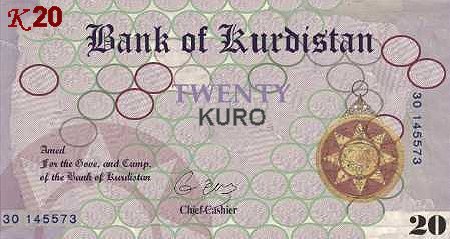
The Kurdish national currency KURO inherited its name from a common combined word in Kurdish language. KURO is combined of Kur -which is the international code for Kurdish language, and the bibliographic classification and the letter O which is a common noun maker in Kurdish for example the word, dillo, hezo, wero, nazo, delalo and so on.
The smallest unit of Kurdish currency calls WIRDE, which in fact driven from the Kurdish word “WIRDE = bits, small”. Each 100 WIRDE is equal to 1 KURO. The amount 124.36 is read as “Sed u bíst u cuwar KURO u sí u shesh Wirde”.

»» Please note that this image is only a sample work for viewing propose.
What is Money?
Money is an agreement. The agreement may be voluntary or coerced, conscious or unconscious, and may fluctuate with time or remain fixed. Within a community all kinds of communities–large and small; local, national, international, or virtual; cooperative or competitive–may create such an agreement.
To use something as a medium of exchange. The money itself can be issued en masse by a central authority or created ad hoc by two consenting parties in a mutual credit system; it may store value or merely mark transactions; it may be backed or valued with something tangible or merely by the issuing authority; and it may take any shape–coins and bills.
National currency
Benefits of the national currency model National currencies fueled the industrial revolution; have proven flexible enough to be adopted by all countries, independent of political/historical context; have attracted sophisticated financial services and institutions; and are “legal tender for all debts public and private”.
The Bank of Kurdistan (Bankí Nawendí Kurdistan)
The Bank of Kurdistan is the central bank of the Federal Republic of Kurdistan. The Bank was founded in – – – -. Standing at the centre of the Kurdistan’s financial system, the Bank is committed to promoting and maintaining a stable and efficient monetary and financial framework as its contribution to a healthy economy.
Prepared by Dilan Majid Rostam Roshani (27 Jan 1996)
External Information source
- The Money Museum
- The History of Money
- The World of Bank Notes


